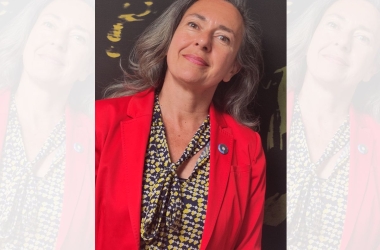Senior Lecturer Amy Abdou Publishes Paper on Supplemental Education Programmes

Abdou’s Research Focuses on How Social Entrepreneurs Strive to Bridge Educational Gaps in Migrant Communities
To better understand how social entrepreneurs can contribute to the improvement of supplemental education programmes and the reduction of disparities in education, Wittenborg senior lecturer Amy Abdou recently co-authored a research paper in the Taylor & Francis Group journal ‘Measurement: Interdisciplinary Research and Perspectives’.
Titled ‘Disruption Through Bricolage: Assessing the Efficacy of Social Entrepreneurs in the Supplemental Education Market’, the work was written in collaboration with Wittenborg Associate Professor and Deputy Head of the School of Business Dadi Chen and Marie Louise Blankesteijn, from Vrije Universiteit Amsterdam.
The research highlights that, in the Netherlands, there is a growing gap between pupils who come from low-income and high-income households and the consequences are greatest for pupils from non-Western migrant backgrounds. In 2018, according to the Dutch Inspectorate of Education, pupils from non-Western migrant households made up to 68% of the lowest level of secondary education in the four largest Dutch cities. This is particularly significant for the majority of pupils in Amsterdam Zuidoost, impacting their future prospects in the job market.
The growing gap in education parity has produced a range of social enterprises that are designed to help pupils from low-income and migrant communities. The Dutch Inspectorate of Education estimates in the school year 2018/2019 one quarter of pupils in their final year of primary school received “aanvullend onderwijs” or supplemental education outside school hours. This is done in the form of tutoring, homework support, test/exam training, extra support for specific learning needs and study skills training. Approximately half of those pupils participated in government subsidised programmes.
Abdou points out that the study focuses on social enterprises that are combining the resources at their disposal in clever and innovative ways to close the gap in education parity. This way, they can create equal opportunity for all Dutch citizens to develop to their full potential. “We deliberately chose to focus on how local social entrepreneurs are addressing the problem to highlight the ways in which migrant communities are creative and resourceful,” she says.
The author explains that the case study employs 60–70 tutors and serves 400+ pupils from 27 local primary schools. The organisation currently has a waiting list for their services and low-income parents have priority. Once the list reaches a certain number, the director contacts the city managers to see if they can catch the overflow with an additional grant pot. This has led to the expansion of the programme from 30 pupils in 2009 to more than 400 in 2020.
To analyse the organisational practices, the efficacy and the innovative elements of the case study’s supplemental education programme, the authors employed a mixed-methods approach. Data was collected via surveys of participating pupils and staff members, individual interviews with two tutors, a teaching assistant and the co-founder/director, focus group discussions with parents and pupils and informal discussions with the director and staff.
Findings of the study
The quantitative data gathered by the researchers shows that pupils participating in the case study’s supplemental education programme were most likely to receive HAVO (pre-applied sciences university track) study advice. Moreover, they received, on average, higher study advice than their peers in Amsterdam Zuidoost but not the city of Amsterdam.
However, it is not possible to conclude the increase is a direct result of the case study’s programme. The researchers underline that the parents play a strong role in the selection of the participants, which indicates a bias in the sample. The programme brings together pupils whose parents are actively engaged in their children’s supplementary education but lack the financial resources to afford private tutoring. Furthermore, the case study also helps provide the parents with the necessary tools to become active, engaged advocates for the children’s education.
Another topic addressed by the paper is the concept of 'bricolage', which indicates a process where entrepreneurs discover or create opportunity by utilising existing resources that other entrepreneurs would either ignore or reject. This was evident in the organisational practices of the case study through the use of community centres, freelance teaching staff, free or donated learning materials, improvisation and experimentation in the classroom.
By employing creative and innovative strategies, the case study manages to overcome some of its limitations and increase the quality of the programme offered to its pupils. Nevertheless, the authors note that despite the disruptive impact of bricolage on education, it is recommended that the organisation adopts a hybrid entrepreneurial logic, by also investing in the formalisation of some of its practices.
Abdou comments that those employing bricolage in the supplemental education market contribute to the market through improvisation and utilisation of existing resources. This can lead to disruption through the increased demand for new educational services and products that are designed for an underserved community.
“Bricolage is a low-cost grassroots strategy for combatting the rising gap in education parity for low-income and migrant communities. However, it is important to note that, despite its many benefits, bricolage can also constitute a barrier to formalising training and methods of evaluation. This, in turn, may inhibit the capacity of the supplemental education providers to partner with institutional actors like schools and universities. This is a factor that needs to be taken into consideration if these organisations want to scale up their activities,” she concludes.
WUP 06/08/2024
by Ulisses Sawczuk
©WUAS Press